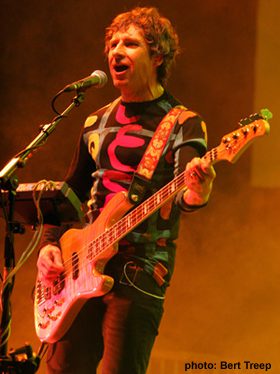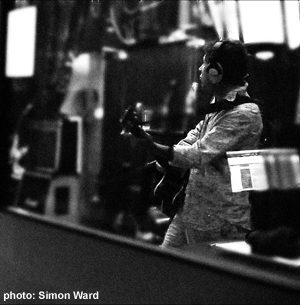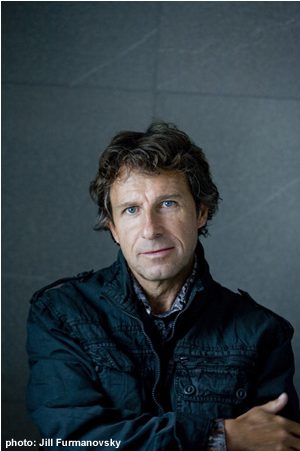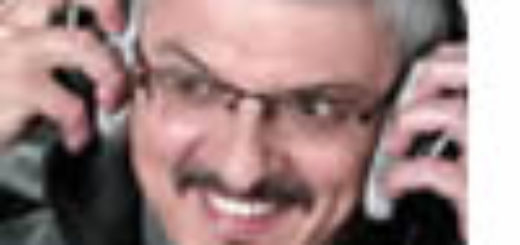Interview with Pete Trewavas
It has been the fourth time when the Polish festival Legends of Rock took place. This year the organizers decided to invite a band which has won hearts of thousands of Polish fans. No wonder as each of their concerts is a masterpiece and every new album is awaited impatiently. In a beautiful scenery of Dolina Charlotty, Marillion filled the whole amphitheatre with audience. The night air was saturated with true magic that created a unique atmosphere of enchantment and made everyone present there feel that they were taking part in something profound. Before the concert began, right after the rehearsal, the bassist Pete Trewavas, agreed to answer a few questions concerning his work, experience and life in an exclusive interview for Opinia.
Why did you decide to record „Less Is More” that consists of previously released songs but in different versions? I bet lots of your fans were waiting for something brand new.
PT: There are lots of reasons why we decided to do that. Primarily, we wanted to give ourselves some space between writing the next album because we’ve been perpetually on this treadmill of writing the album, recording an album, going on tour with an album and straight away going back in the studio to write the next album. After „Marbles„, „Happiness Is The Road„ and „Somewhere Else„ in the middle, we’d written lot of songs for those three albums and we felt we needed a break and Steve [Hogarth] needed to get some inspiration for new lyrical ideas. We thought a good way of being able to give ourselves a bit of a break and have fun with the music was go back and visit some of our favourite songs and do them acoustically. That came about because quite often we are asked to do little fanclub conventions or various smaller concerts that we don’t feel we can do as a band so we do them acoustically. We’ve done a few shows acoustically as a whole band, and we’ve done some other shows where it’s just three of us: Steve [Hogarth], Steve [Rothery] and myself. That’s all gone down very well as well as some live recordings of us. There’s a couple of albums of us notoriously. „Unplugged at the Walls„ is quite a popular around there with our fans. So we thought: „Why don’t we go in a studio and do a proper studio album of acoustic songs?„ But then we were talking to our producer Mike Hunter about it and he said: „Well, if you’re going to do this, you should do it properly acoustic and should use acoustic instruments.„ We wanted to rearrange the songs, some of the songs we completely rewritten to fit that genre and style. So we only recorded on acoustic instruments. I learnt to play the glockenspiel, Mark learnt to play the autoharp, we were using bongos and all kinds of interesting instruments. Steve Rothery was using the Portuguese guitar, Ian was using so interesting percussion that we wouldn’t normally get to play around with. And it was a huge success as an album. It’s gone down very well.
Yes, congratulations on that.

PT: Thank you.
Apart from Marillion, you take part in other project like Kino and Transatlantic. What do you find in those bands that you can’t have with Marillion?
PT: It’s nice to have sort of a break from Marillion. Marillion is a fantastic thing. We’re all very proud of Marillion, we’re very conscious of how good Marillion is and what a great experience we have. And the fans are just fantastic and our audience is an amazing. We appreciate that immensely. But sometimes it’s very easy when you’ve been together for so many years to take everything for granted and it’s good to get away, do other things. Particularly with Transatlantic, I get to play with some quite formidable players and just get to a have bit of fun with music. And it’s not too serious. The thing about side project is that they’re a bit of fun away from your job. But obviously, I love music. It sounds cliché, but music was my first love and anything I would want to do in life, I’d want to involve music. So, it’s great to be able to get away, do things that I can just have fun with, but also involve music. It’s a good experience for me to stretch myself sometimes and do things I wouldn’t necessarily get to do. On the last Transatlantic album, „The Whirlwind„, there’s some fast playing that I wouldn’t normally get around to doing in Marillion because it’s a completely different sort of project. It’s a project where there’re four soloists. It’s like The Who, where we can all just solo and play to our heart’s content, whereas in Marillion it’s more about getting song across. So in Marillion you play what is required and anything else just sticks out like a sore thumb. It’s good fun to be able to stretch and do other things.
Do you think the other projects somehow influence the stuff you do with Marillion?
PT: They not necessarily influence my playing in Marillion, but I get a lot out of them. One thing that I have noticed with playing „The Whirlwind„ live with Transatlantic was that I had to do a lot of rehearsing because there’s a lot of fast, riffy playing. It’s not what comes naturally to me, so I rehearsed a lot. Since I was also doing stuff with Marillion, that meant that in the end I was playing for about seven or eight hours a day which I don’t normally get to do. That’s what normally professional violinists do. And I noticed that my playing got a lot better. And I was a bit more prolific with my execution. I’ve taken it on board and thought I should do more practising at home, just keep my fingers nimble. So I’m going to do that. It also means that obviously you’re seen in a slightly different light so sometimes it helps you to be able to get your point across. But it’s satisfying for me to know that I’ve achieved something else as well; there’s another thing I’ve ticked off my list of a few more things and to have a few more experiences in life. That’s what it’s all about. I’m at the age where I’ve done a lot of touring – I’m a very fortunate person. For anybody who’s at the stage this weekend and anyone in this business is in a unique situation because they’ve managed to achieved their goals in life. They’ve managed to do that thing that is so rare. Lots of people want to be footballers or airline pilots or musicians and hardly any of us get to do that. And it’s nice for me at my age now to be able to sit back and reflect on that a bit more and think „Oh, this is great„. I’m doing things now because I want to do them and I want to take away the experiences. I don’t do it because I think „Oh, I’ve got to do that because it’ll enhance my career!„ I’ve had a great career in music and I’ve done lots of things and I’ve ticked lots of boxes, I’ve had number one album success, I’ve got singles success, I’ve got gold discs, so I’ve done it really. So it’s nice to be able to be a bit more relaxed about it.
Being active in all sorts of media usually goes together with small or big compromises and there’s nothing wrong in it – it’s that sort of business. But is there anything you would never agree to?
PT: I’d never play naked [laugh]. There are a few things I wouldn’t do. I’ve never wanted to sell out. I’ve never wanted to do things that don’t excite me. And I’ve been quite lucky with Marillion. Although we’ve been signed to major record labels and we’ve had various bits of success and people were trying to push us in certain directions just to give a record company or a management company a little bit more success thinking „Well, if they wrote another song like Kayleigh that’d be a good idea„ or „If they got back together with Fish, that’d be a good idea„. And there are a few things I just wouldn’t do – anything I feel uncomfortable about or I‘ve decided I don’t really want to do.
So you must feel certain to do things.
PT: Yeah, I think so. I think everyone should be true to themselves because if you’re not true to yourself in life then ultimately you let yourself down. If you let other people down, it doesn’t really matter, but if you let yourself down, because you’ve taken your eye of the ball, or you’ve agreed to something that somehow cheapens your art or your career or what people think of you, it’s very hard to get that back. So it’s something you need really to guard against. That’s really hard. I was so lucky really. It was a struggle to get into music business and it’s a struggle to do all of this but it did happen, we had a lot of lucky breaks. You’ve got to be very good, you’ve got to be talented but need that incredible amount of luck on your side as well, but it happened for me. I’m quite lucky to be in a situation where I can say „Well, I’ve actually never wanted to sell out„. Because when you’re a young kid in a band and you want a record company to get behind you, lots of people would come along and say „If you do this, we’ll sign you to our label and we’ll give you this, but you’ve got to do this in return„ and it’s so easy to turn around and say „Yes, ok, where do I sign?„.
In the era of MTV, VIVA and music that’s broadcast on in a typical radio station, progressive music seems to be neither popular nor easy to listen. What do you think makes Marillion still at the top?
 PT: That’s tough. There’s no real reason for anybody to want to play us, because we’re not young, we’re not fashionable, we never really have been fashionable, to be honest. Even when we were written about or when we were having success, we weren’t really fashionable people. The media looked on us with disdain and wondered why we were there and what all of this buzz was about, why are people so excited about Marillion. We were discovered by the fans and pushed into the media because of our popularity at festivals and in clubs like Marquee rather than someone from the media discovered us. So no one has a big story to tell about us. It just happened. It’s always been a resentful relationship that we had with the media ever since. And that goes along with TV companies. They’ve never really taken us seriously. I guess we just go along doing what we do. The beautiful thing about it is if people like what you do, you get noticed. I feel that we should be bigger. And it really breaks my heart that we’re not taken more seriously and don’t have a broader fan base because our music is the sort of music that lots of people who listen to loads of sorts of bands would get into. We just have to get on. That’s one part of my life that disappoints me. I don’t see why it never happened in a way that it did to other bands like Radiohead or Coldplay. There’s a lot of bands around that become huge. I wonder what the main difference was; I guess it’s money. It’s usually not anything else. It’s down how much money our record company will spend on a campaign.
PT: That’s tough. There’s no real reason for anybody to want to play us, because we’re not young, we’re not fashionable, we never really have been fashionable, to be honest. Even when we were written about or when we were having success, we weren’t really fashionable people. The media looked on us with disdain and wondered why we were there and what all of this buzz was about, why are people so excited about Marillion. We were discovered by the fans and pushed into the media because of our popularity at festivals and in clubs like Marquee rather than someone from the media discovered us. So no one has a big story to tell about us. It just happened. It’s always been a resentful relationship that we had with the media ever since. And that goes along with TV companies. They’ve never really taken us seriously. I guess we just go along doing what we do. The beautiful thing about it is if people like what you do, you get noticed. I feel that we should be bigger. And it really breaks my heart that we’re not taken more seriously and don’t have a broader fan base because our music is the sort of music that lots of people who listen to loads of sorts of bands would get into. We just have to get on. That’s one part of my life that disappoints me. I don’t see why it never happened in a way that it did to other bands like Radiohead or Coldplay. There’s a lot of bands around that become huge. I wonder what the main difference was; I guess it’s money. It’s usually not anything else. It’s down how much money our record company will spend on a campaign.
Which way of composing is closer to you: fast and spontaneous like with Transatlantic or deliberate like with Marillion?
PT: Well, Marillion does all sorts of writing, but I enjoy the spontaneity of the way Transatlantic works. It’s very fast. I mean it is spontaneous when we meet all together because it has to be. We only give ourselves a few days to arrange and record an album. So it’s quite a ridiculous schedule that we put ourselves under, but it’s immense fun. But having said that, we go to a project prepared, so we’ve all written lots of ideas. And we’re all the sort of musicians that if there was a shortage of ideas, we all have ideas in our heads so we can say „Oh, this is what I should do„. We all come down to breakfast the next day with tonnes of new ideas that we want to try out as well. And Marillion works in a slightly different way. With Marillion we tend to jam all of the ideas, so we write together. And that’s a lot of fun as well. That’s kind of more rewarding, there’s more thought that goes into Marillion and I feel that Marillion’s music is stronger because of that.
Which of your albums do you consider the dearest to you and why?
PT: I’m very close to „Happines Is The Road„, because I really like some of the approach of some of the writing on that album. For me it was close to perfection. I like songs like „Asylum Satellite„ and „Essence„ and the second half of „Thunderfly„ and also a song called „Planet Marzipan„ – I just love the start of that song because I’m playing a really interesting bass line, but also what Mark does on the keys is just genius. And it’s great to be in a room and watch other people come up with an amazing idea. That’s an experience that I really enjoy immensely about Marillion. We’re all there and it all happens and when it all comes together it’s fantastic. You’re never tired of that. Having been together for so many years – we’ve been together for twenty years – doing what we do, it never gets boring. I find that incredible because it was a bit struggle to start writing „Happines Is The Road„. And I did wonder whether we would ever get around to writing it. But then, towards the end, when we were just in the zone, we were completely focused on what we were doing. These were latest stages of the writing when we were just completely sort of free to do what we wanted and where there was no pressure on us because we’d written lots and lots of music. Just to watch people come up with genius ideas is so exciting.
You seem to be extremely busy musician, I’ve read you sleep two or three times a month. [laugh]
PT: Oh no, I sleep a little longer than that. [laugh]
So… do you ever rest? [laugh] How do you relax?
PT: I do rest! I went on a fantastic holiday not so long ago. At the end of the Transatlantic tour I went to Antigua for a week with my wife and my youngest son. That was really nice. That was also a complete break because I didn’t have a computer with me, I didn’t have internet access and it was a great feeling to sign off my last email and say „I’m going to be away for a week so everything will just have to be put on hold„. That was really nice. But generally I spend the evenings with my wife just watching boring TV. I love music, but the strange thing about working with music all day is that you get to a state where you don’t want to hear music any more. You’ve had enough music in your ears. Doing the Transatlantic thing and working with Marillion all at the same time meant that whenever I thought „Well, I’ll listen to some music„, I’d sit down and think: „Actually I shouldn’t be really listen to this. I should be doing some work. I should ether be listening to some Transatlantic songs and learning them or I should be listening to some Marillion ideas and arranging those.” So that is very hard sometimes to justify listening to music just for fun. Luckily now, all the Transatlantic stuff is finished for a few years, we’re in the middle of writing for Marillion, so maybe I’ll get back to listening to music for pleasure.
Do you have any other hobbies apart from music?
PT: I read books. I’ve always got a book on a go. This book is a rubbish book actually [showing a book by Lee Child he’s presently reading]. Not Shakespear but easy to get in to. It’s just a book about some ex military kind of do gooder, who tries to save the day and helps damsels in distress. But I read all sorts of books. I didn’t really read when I was young so every now and again I’ll buy a book by either Dickens or Hemingway. I’ve read some Hemingway recently just because I thought I should really catch up on some of these older authors. But I read all sorts of books. One of my favourite authors was John Irving, the American writer who wrote „World According To Garp„ – I love him. I used to read a lot of Steinbeck who wrote „The grapes of wrath„ – that’s a fantastic book. Anything I find interesting – Kurt Vonnegut used to be an interesting writer. And of course I read the „Millennium„ books as well. That was interesting reading by an author who wasn’t either English or American [Stieg Larsson – Sweden]. He gets a slightly different insight into people’s psyche. I’m used to reading American authors or English authors so it’s quite nice to take somebody else’s point of view on board.
And the last question: What direction does Marillion plan to go, if any at all?
PT: I think the next album will be country and western album. No… I don’t know. I mean we’ve done the acoustic album which, I suppose, is slightly folky. I don’t know, it’s really hard to know. I mean, the thing about writing music is that if you’re doing it right, you just let your mind go free and do whatever comes into your head, trying to be a pure artist. We’re in a lucky position of being able to do that because we’re not beholding to anybody apart from ourselves. I remember Björk in an interview when somebody was asking her what her new songs were going to be like she said the thing about writing is, it’s like when you go to sleep, you never know which position you going to wake up in, and writing songs is like that – you never quite know what sort of songs you going end up writing until they’re finished. So it’s very hard to know. But I think it will be a rock album I would have thought, maybe a little bit more heavier than we’ve been doing more recently… I really don’t know. You never know.
Thank you very much for your time.
PT: Thank you, my pleasure.
I would like to thank Rich Lee, Lucy Jordache and Simon Ward for your help.





